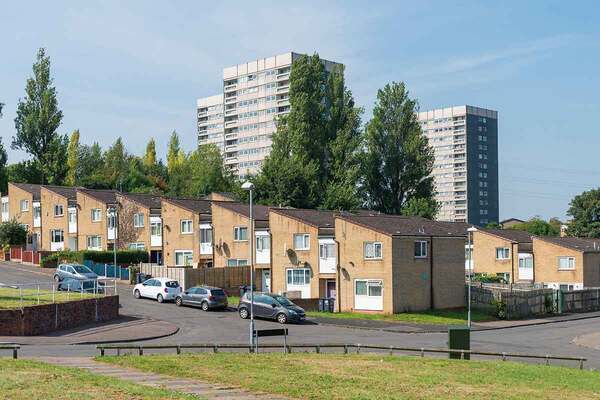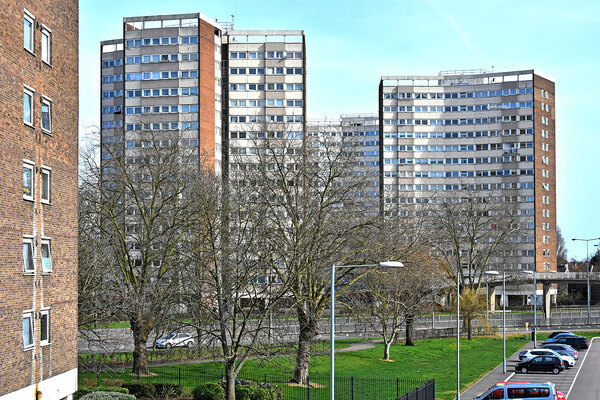You are viewing 1 of your 1 free articles
The Week in Housing: LFB completes Grenfell Inquiry recommendations and BSR extends deadline
The Week in Housing is our weekly newsletter, rounding up the most important headlines for housing professionals. Sign up below to get it direct to your inbox every Friday

Good afternoon.
There were two significant building safety announcements for the sector this week.
More than six-and-half years after the Grenfell Tower fire claimed 72 lives, and nearly four-and-half years after inquiry chair Sir Martin Moore-Bick published his phase one report, the London Fire Brigade confirmed it has completed all 29 recommendations aimed at the organisation.
Covering areas such as improved communication, training, emergency calls, equipment, and knowledge and understanding of materials used in high-rise buildings, the recommendations aim to help prevent such a tragedy from reoccurring.
As London mayor Sadiq Khan said: “[The] most fitting tribute to the people who died, their loved ones and those who survived, is to ensure that nothing like this ever happens again.”
However, he added there is “more to do” and that “it is vital that the government steps up, along with housing and building industries, to act now and ban combustible materials in external walls no matter their height and provide funding support for those unfairly saddled with large costs to remediate unsafe cladding”.
In other significant building safety news, the Building Safety Regulator (BSR) finally gave the industry some slack by extending the competency assessment deadline by 13 weeks for registered building inspectors. It had previously held firm on the deadline, but on Thursday the BSR said it had listened to concerns.
Inspectors will still need to be registered by 6 April, but hopefully the move will help mitigate the crisis that the industry has been warning about.
This week, the Housing Ombudsman launched a consultation on its draft business plan for 2024-25, which proposes a 40% increase in payable fees to £8.03 per home and asks what landlords think about a ‘polluters pay’ model. The latter will likely be welcomed by some, but inevitably not by others.
The watchdog said the hike in fees, which comes at a time of significant financial pressure for social landlords, is to “support sustainable increases in caseworker headcount” and “deliver more determinations in the face of continuing significant demand increases”.
Housing ombudsman Richard Blakeway explained that demand for the service is “unprecedented”. He said the main aim of the plan is to reduce that demand by supporting landlords to improve their complaint-handling.
As a finding against Lewisham Council showed, some landlords definitely need help. The Housing Ombudsman made two compensation orders worth an incredible near £40,000. The orders reflected the time households suffered with extreme damp and mould, conditions described as “dire” by the ombudsman.
Another sobering report, published this week by Pathway and Crisis, found that homeless people face some of the worst access to healthcare due to discrimination and stigma.
The report surveyed 156 medical professionals across England to examine how people in ‘inclusion health’ groups – those who are socially excluded – struggle to access health services. According to the homelessness charities, two-thirds of healthcare professionals reported that people without proof of address or ID were refused access to GP services.
An alarming statistic was published by London Councils: the number of refugees sleeping rough in the capital after leaving Home Office hotels increased by 234% in four months. Boroughs are calling on the government to commit to a 56-day move-on period, instead of the current 28 days, for refugees and asylum seekers leaving Home Office accommodation after a decision is made.
Remaining in the capital, a council was forced to apologise over its failures involving a man who was left homeless after fleeing domestic abuse that the authority failed to legally recognise. Kensington and Chelsea Council issued an apology following an investigation by the Local Care and Social Ombudsman.
Highlighting the impact of the cost of living crisis, Inside Housing dug into rent arrear figures in the English regulator’s annual entity accounts for landlords last year, which revealed that arrears rose 8.4% to a record high of nearly £800m. It was the highest single year jump since before the coronavirus pandemic.
Elsewhere, a two-horse race to buy a housing block in Essex appears to have been won this week, with Harlow Council confirming it exchanged contracts with developer Hollybrook to buy the 172-home Burnt Mills building.
The deal is “set to be completed in the coming days”, and came after a Newham Council document revealed in December that the local authority wanted to buy the block to ease temporary accommodation cost pressures. Following this, Dan Swords, leader of Harlow Council, told Inside Housing he would do everything he could to prevent Newham going ahead with its plan. And he did.
The results for house builder Vistry showed that its completions and profits rose amid high demand for affordable housing. Full-year results for the year ending 31 December 2023 showed there were 16,118 total completions, up 35% from 11,951 in 2022.
Moat defended its above-inflation service charge rises to residents of a shared ownership development in south-east London. The association said the “notable increase” in charges was because it had been given “inaccurate information” about the size of the communal hard surfaces, shrubs and hedges to be managed when it took over the scheme and had to correct this.
Rea Mole, a resident of Phoebe’s Place, told Inside Housing: “Moat’s response, at this stage, is not acceptable. But I am in conversation with them, as are other residents here.”
In better news for leaseholders, an intervention by the Competition and Markets Authority (CMA) means more than 500 households will no longer see their ground rents doubled as a result of “problematic” clauses in lease agreements.
The companies that the CMA took action against, which include investment firms, bought freeholds originally owned by housing developers Countryside, Crest Nicholson, Miller Homes, Redrow, Taylor Wimpey and Vistry, and continued to use the “problematic” contract terms at the expense of leaseholders.
All affected leaseholders will now see their ground rents return to the original fee amount charged when the property was first sold, and it will not increase over time.
Earlier in the week, the government confirmed that double council tax on long-term empty properties will come into force from 1 April. The 100% council tax premium will apply when a home has been empty for 12 months, rather than the current period of two years.
In Wales, a housing association had advised 40 households to leave their homes over a risk posed by reinforced autoclaved aerated concrete (RAAC).
Following a survey of some of its properties in the Hirwaun area, Trivallis identified issues with the roofs and ceilings connected to RAAC and found one of its homes to have a “critical risk”. Another 40 of the landlord’s homes of a similar design and construction could also be affected.
We also published the Welsh government’s ambitious plans for its building safety regime. It will apply to all multi-occupied buildings in the country that contain two or more homes, regardless of height.
In Scotland, the regulator assessed landlords’ financial position as “weaker than it has been for some time”. The Scottish Housing Regulator’s report on landlords’ audited financial statements for 2022-23 revealed that several factors – including high inflation, material and labour shortages exacerbated by the war in Ukraine, and below-inflation rent increases – continued to impact their performance.
In Northern Ireland, housing associations hailed the scrapping of holiday homes tax relief as a “positive step” to addressing the shortage of homes in the country. Chancellor Jeremy Hunt revealed in his Spring Budget speech that he will abolish the furnished holiday lettings regime for the UK as it was leading to “not enough properties available for long-term rental by local people”.
Elsewhere, the Chartered Institute of Housing (CIH) Northern Ireland welcomed an extra £3m in funding for the Supporting People Programme. The CIH said the funding, announced by new communities minister Gordon Lyons, was a “step in the right direction”.
Inside Housing attended two conferences this week, one in the North and one as far as Cannes, France.
At the National Housing Federation’s Finance Conference in Liverpool, the chief executive of Hyde described annual rent settlements as “madness”. Andy Hulme called for a long-term rent settlement from central government to allow landlords to plan over a longer timeframe.
Also at the conference, the chief executive of L&Q warned that housing associations could stop buying Section 106 homes as they face a new homes “cliff edge”. Fiona Fletcher-Smith said that a slowdown in landlords’ buying and building activity could also hit volume house builders, which require a Section 106 element on their schemes to get planning permission.
At the giant international MIPIM property conference, the chair of the Southampton City Region spoke of the importance of moving away from looking at housing as an isolated problem. While Cardiff Council’s assistant director of development and regeneration highlighted the challenges of spending social housing grant and why MIPIM offers a chance to create growth and jobs across the region.
Mark Farmer, the UK government’s champion for modern methods of construction, told MIPIM delegates that the flagship Affordable Homes Programme needs to be completely reset.
Have a good weekend.
Gráinne Cuffe, deputy news editor, Inside Housing
Say hello: grainne.cuffe@oceanmedia.co.uk
Editor’s picks: five stories you may have missed
Cladding remediation: why is progress so slow?
Council plans £20.6m extension to acquisition programme for temporary accommodation
Ready to check out: the lengthy repairs forcing tenants to live in hotels
The recruitment challenge: social landlords say they are struggling to compete
Sign up for our Week in Housing newsletter
Already have an account? Click here to manage your newsletters











